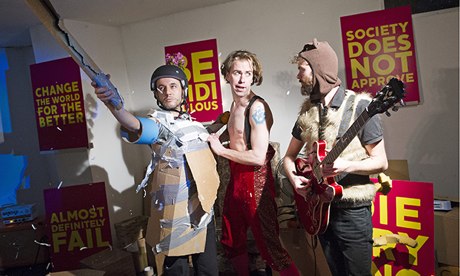You have no items in your cart. Want to get some nice things?
Go shopping
…it is precisely theatre, art and literature which have to form the ‘ideological superstructure’ for a solid, practical rearrangement of our age’s way of life…
These words of Bertolt Brecht have echoed in my mind this week as I reel from the double bill of Don Quijote and #TORYCORE at Camden People’s Theatre on Saturday night. They were playing as part of the theatre’s Hard to Resist festival, which attempts to understand and question the form and uses of political theatre in the twenty-first century.
The former, presented by Tom Frankland and Keir Cooper, takes Cervantes’ classic tale and rips it to shreds, quite literally. From the moment the big bulky book is hacked to pieces, the duo probe what it means to be a “Don Quijote” in 2014. This figure, they suggest, was one who wasn’t afraid to dream big, to go against the grain and imagine the impossible (it’s no surprise that this evokes “Be realistic: demand the impossible”, the famous dictum from Che Guevara). The piece deconstructs the legend, examines it and puts it back together again in a way which we can access. We might be doomed to fail, they say, but to have ownership over that is important.
#TORYCORE takes a louder, less subtle approach, but is no worse for it. The trio of Lucy Ellinson, Steve Lawson and Chris Thorpe have come up with a novel way of tackling the issue of austerity by reading Tory party policy underscored with “the sound of pure evil”. Ellinson makes her way through a number of speeches and policies as the two musicians churn out deafening death metal from their guitars. It’s a visceral, angry experience, but the show manages to find some kind of strange optimism as a room full of people undergo a collective catharsis in protest of the government’s actions.
It’s difficult to tell how “successful” these two pieces are, and not least because a definition of “successful” is almost impossible to pin down in this context. Some may argue that theatre like this only “works” if its audience stream out of the theatre to start a riot, or if it manages to create a wholesale shift in worldview. Equally, they shouldn’t simply be confirming the views of a load of comfortable lefties and making progressives feel good about themselves. The sweet spot probably lies somewhere between these two extremes.
The truth is, of course, that “political theatre” is a misnomer. Everything relates to the Greek notion of politikos (of, for or relating to citizens), whether directly or indirectly, so all theatre is therefore political, especially seeing as it enacts a collective experience. To this extent, all theatre – indeed, all cultural artefacts – have some impact on the way we think and interact with one another. Everything we experience inevitably bears some relation, however minor, to the way in which we interpret the world.
This self-consciousness, perhaps, is all that separates self-described “political theatre” from everything else. By becoming and representing itself as aware of its values and goals, it invites an audience to analyse something in a particular way. The label only invites us to enter with a specific set of expectations.
So how would “political theatre” feel were it not to be called such, and vice versa? #TORYCORE, for example, could – on a surface level – be enjoyed as an exercise in anger and noise (though we have to accept that those things in themselves are not without political consequence). Conversely, describing The Lion King (for example) as “political theatre” would entirely shift our perceptions of it, would force us to get under the surface of what it’s doing and, crucially, saying.
The Hard to Resist Festival at Camden People’s Theatre asks us to interrogate what a piece of theatre says to us, to deconstruct signifiers and formal decisions to consider how a work of art questions our own place in the world and what we can do to change it. These shows bolster the idea that art, and by extension we, can make a difference. Above all, it demonstrates that all theatre, all art, all culture is political, and that we shouldn’t be afraid to describe it as such.
#TORYCORE has closed, but Don Quijote has more performances on January 25, January 31 and Feb 1. See here for more information

About Dan Hutton
Dan is a freelance critic and theatre-maker. He won the Howard Hobson Award for Theatre Criticism at NSDF in 2010, 2011 and 2013, and in 2013 was the runner-up for the Edinburgh Fringe Allen Wright Award for Arts Journalism. Dan is also a director and co-runs Barrel Organ Theatre.




